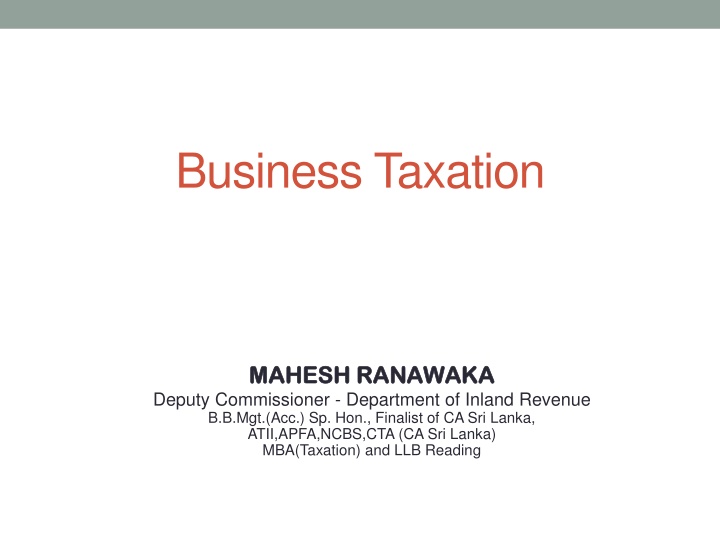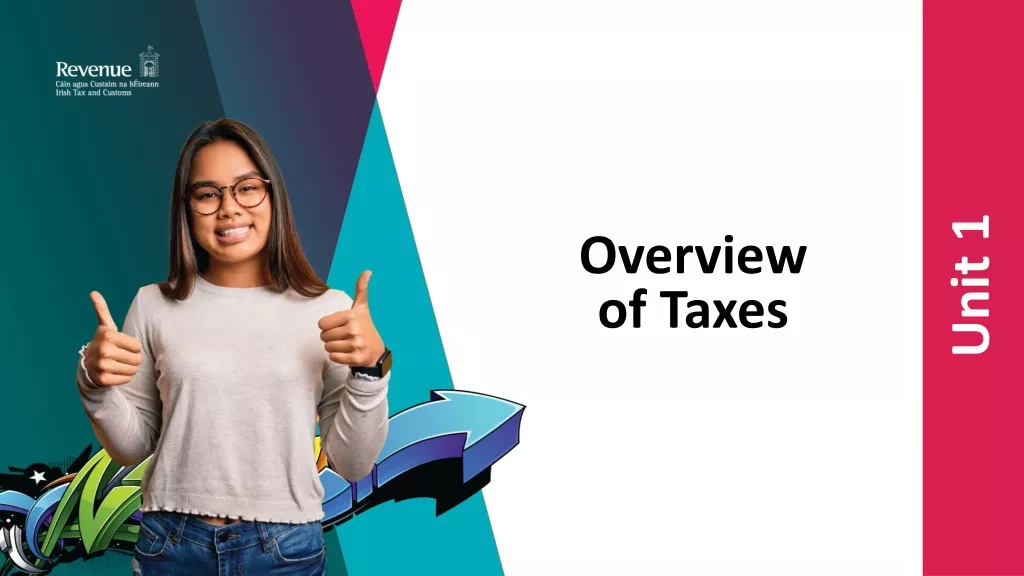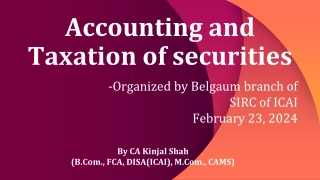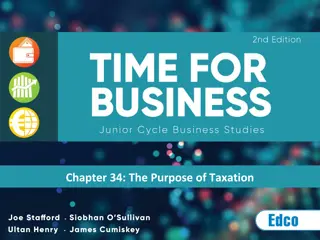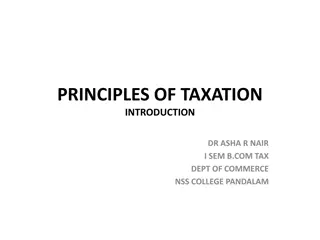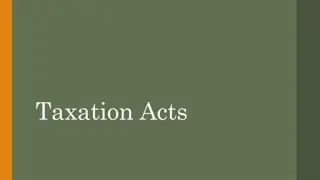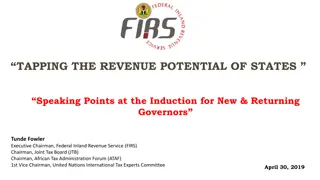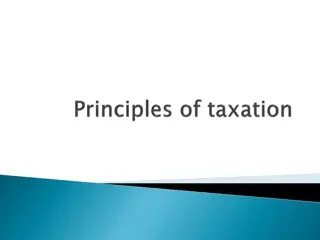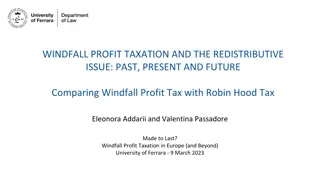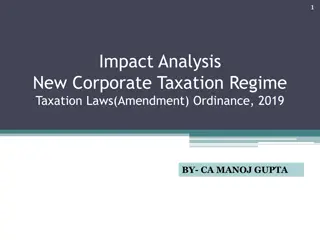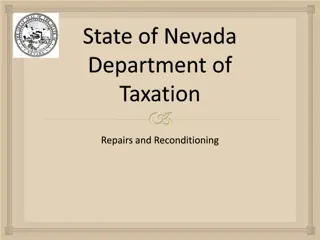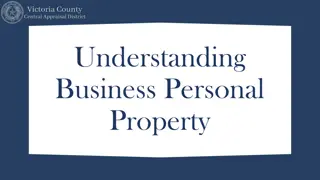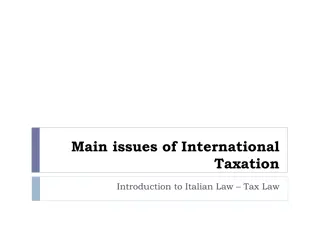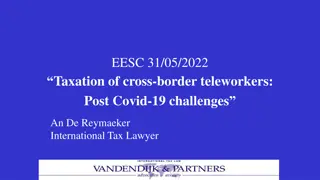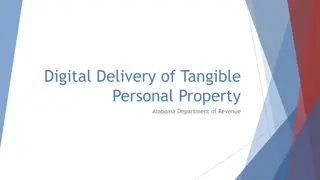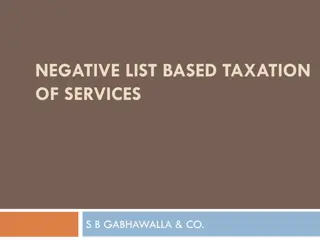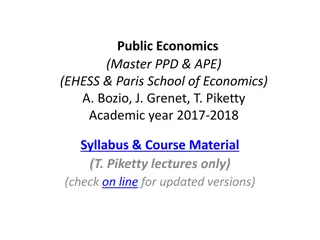Business Taxation
Taxation plays a vital role in government revenue generation and economic stability. Explore the basics of tax, its objectives, functions, and principles with Deputy Commissioner Mahesh Ranawaka. Learn about the importance of equity, simplicity, and economic factors in taxation.
Download Presentation

Please find below an Image/Link to download the presentation.
The content on the website is provided AS IS for your information and personal use only. It may not be sold, licensed, or shared on other websites without obtaining consent from the author.If you encounter any issues during the download, it is possible that the publisher has removed the file from their server.
You are allowed to download the files provided on this website for personal or commercial use, subject to the condition that they are used lawfully. All files are the property of their respective owners.
The content on the website is provided AS IS for your information and personal use only. It may not be sold, licensed, or shared on other websites without obtaining consent from the author.
E N D
Presentation Transcript
Business Taxation MAHESH RANAWAKA MAHESH RANAWAKA Deputy Commissioner - Department of Inland Revenue B.B.Mgt.(Acc.) Sp. Hon., Finalist of CA Sri Lanka, ATII,APFA,NCBS,CTA (CA Sri Lanka) MBA(Taxation) and LLB Reading
Familiarity Familiarity
INTRODUCTION INTRODUCTION OF OF TAX ATION TAX ATION
What is the Tax ? Tax is a compulsory levy or a fee that imposed and charged by the Government from the public for common causes. Cannot refuse to pay tax. Any refusal in this regard leads to punishment. Tax impose a personal obligation on the tax payer. When a person become liable to pay tax, if it is the duty of him to pay it.
What is the Tax ? Tax revenue is used for the general and common benefit of the people as a whole. Tax is a legal collection. It can be levied only by the Government. the payment of tax is regular and periodical in nature Tax is levied on all people without any discrimination. but according to their ability to pay.
What is the Objective of taxation ? What is the Objective of taxation ? Raising Government revenue Removal of inequalities in income and wealth Ensuring the economic stability Capital accumulation Creation of employment opportunities
Function and purpose of taxation Economic factors Collection of taxes - withdrawal from the economy. Government expenditure - Injection into the economy. - Provision of public goods and services. - Direct the economy towards policy objectives Social Factors Redistribution of wealth
Principles of Taxation Equity Tax system base on the ability to pay Certainty time of payment , manner of payment and amount to be paid, should be clear and plain to contributor and every other person.
Principles of Taxation Simplicity tax system should be simple, easy and understandable Economy minimum expenses for tax collection & maximum revenue to Government Treasury
Principles of Taxation Stability tax structure once designed with care and long term objectives in view, must as far as possible be unchanged. Progressivity higher income groups should pay proportionately more than the lower income groups.
Who bear the TAX Tax will be affected on two ways. Direct affect :- To pay the taxes if there is a liability to pay Tax bear by the payee. It s cant be transferred to other tax. Indirect affect :- To compliance under special regulation available in the Tax law. Tax bear by the other person It s can be transfer to other
Scope of Taxation legislation Act Gazette Notification Ruling issued by the Department Decided Tax Cases by courts Departmental (IRD) procedures
Tax Authorities in Sri Lanka There are basically four tax authorities In Sri Lanka Inland Revenue Department Sri Lanka Custom Excise Department Provincial counsel Revenue Department
Department of Inland Revenue (IRD)
IRD Venue Inland Revenue Building ,Colombo 02. Mission To collect taxes in-terms of relevant tax and other related laws, by encouraging voluntary compliance while deterring tax evasion and tax avoidance, and To enhance public confidence in the tax system administered by the Department of Inland Revenue by administering relevant tax and other related laws in a fair, friendly and expeditious manner and thereby facilitate a beneficial tax culture
IRD Main Objectives Get assurance whether tax payer remitted the correct taxes ,by correct way on due date. Awareness of the Tax community and the General public InformationSource www.ird.gov.lk Tax Payer service Unit (1st floor , IRD Building ) Paper notification
IRD Tax System Since 1932 Income tax was first introduced in Sri Lanka in 1932. (First year of Assessment 1931/1932). The Income Tax Department was established in the same year to administer this tax. Mr. N.J. Huxham was the first Commissioner. Year 1972 -Introduction of the Self Assessment Scheme. Year 1971-PAYE scheme was introduced. Year 1979-Introduced current year basis taxation (79/80)
Organization Chart IRD Commissioner General (CGIR) Deputy Commissioner General (DCGIR) Senior Commissioner (SCIR) Commissioner (CIR) Senior Deputy Commissioner (SDC) Deputy Commissioner (DC) Assistant Commissioner (AC)
IRD Taxes administrated Income Tax (IT) - PAYE - Withholding Tax on Interest, Treasury Bills, Company Debts Security - Withholding Tax on Dividends Value Added Tax (VAT) -Value Added Tax on Financial Services (VATFS) Nation Building Tax (NBT) -Nation Building Tax on Financial Services (NBTFS) Economics Service Charge (ESC) Betting & Gamming Levy Stamp Duty Construction Guarantee Fund Levy
Income Tax Imposition of Income Tax Tax imposed through Inland Revenue Act No. 10 0f 2006 and subsequence amendments, Inland Revenue (amendment) Act No. 10 0f 2007 Inland Revenue (amendment) Act No. 09 0f 2008 Inland Revenue (amendment) Act No. 19 0f 2009 Inland Revenue (amendment) Act No. 22 0f 2011 Inland Revenue (amendment) Act No. 08 0f 2012 Inland Revenue (amendment) Act No. 18 0f 2013 Inland Revenue (amendment) Act No. 08 0f 2014 Inland Revenue (amendment) Act No. 08 0f 2015 Inland Revenue (amendment) Act No. 08 0f 2016
Income Tax Section 2 Charging Section Income tax shall , subject to provision of this Act, - be charged at the appropriate rates specified in the schedules of Act, - for every year of assessment, - in respect of the profit and income , - of every person
Income Tax Every Person Act (section 217)defined as, Person include a company or body of person or government; any Company registered under any law in farce in Sri lanka or where and include the public corporation; mean any company incorporated or else Body of Person include any local or public authority any body corporate or collegiate , any fraternity fellowship, any association, whether incorporate or unincorporate, and Hindu undivided family, but does not a partnership: society of person, include a company or
Income Tax Accordingly following persons are therefore chargeable with Income Tax An individual A Company A Trust An executor or administrator A Co-operative society An Association, Club or Society of person A Charitable Institution A Hindu Undivided Family Any local or public authority A Government
Income Tax Tax implication of Residency of person If resident, any profit or income derived or arises in Sri lanka or out side Sri lanka shall be liable to tax in Sri Lanka (Global Income ) If Non resident, any profit or income derived or arises in Sri lanka shall be liable to tax in Sri Lanka. profit or income derived or arises in Sri lanka include, Service rendered in Sri Lanka Property in Sri Lanka Business transacted in Sri lanka
Income Tax Resident For Individual any individual who is physically present for 183 days or more during the any year of assessment shall be deemed to be resident in Sri lanka throughout that year of assessment. For Company is deemed to be resident, if it s registered or principal office is in Sri Lanka, or the control and management of its business is exercised in Sri Lanka.
Income Tax Year of assessment Section 217 year of assessment means the period of twelve months commencing on the first day of April of any year and ending on the thirty-first day of March in the immediately succeeding year;
Income Tax Profit and Income profits or income means the net profits or income from any source for any period calculated in accordance with the provisions of this Act; Sources of Income are profits from any employment Income from properties Net annual value Rent Income Occupier's income Interest Income Dividends Income Profits from any Trade, Business, Profession or Vocation Charges or annuities Discounts royalties or premiums Winnings from a lottery, betting or gambling case of a non governmental organization, any sum received by such organization by way of grant, donation or contribution or any other manner Income from any Other source
Income Tax Appropriate Rates (Tax Rate) Two type of tax rate available under Inland Revenue Act Normal Tax Rates ( Under 1st ,2nd ,3rd & 4th Schedule ) Special Tax Rates (Under 5th Schedule ) Example For Company Taxable Income up to 5,000,000 Taxable Income more than 5,000,000 - 28% - 12% *Marginal tax relief to be concerned taxable income range between 5,000,000 to 6,111,111
Income Tax For Individual On the first Rs. 500,000/- of the taxable income 4 % On the next Rs. 500,000/- of the taxable income 8 % On the next Rs. 500,000/- of the taxable income 12% On the next Rs. 500,000/- of the taxable income 16 % On the next Rs. 1,000,000/- of the taxable income 20 % On the Balance Rs. xxx/- of the taxable income 24 % 29
Income Tax For Partnership Excess amount of Distributable Profit and Other Income Which is exceeds Rs.600,000 - 8% For Dividend At the distribution of Dividend - 10% Deemed Dividend Tax - 15%
Income Tax Concessional tax rate applicable Educational Services Agriculture (Sec.16) Unit Trust/Mutual Funds Agriculture/Manufacture Animal Feeds/Tourism 12% Construction Work Qualified Exports/ Deemed Exports Small Medium Enterprises (less than 500M) Venture Capital Companies Higher Tax rate applicable Manufacture, Import & Sale of Liquor/Tobacco Lottery, Betting or Gaming Activity 10% 10% 10% 12% 12% 12% 12% 40% 40%
Income Tax Consequences for Non - Compliance If Non Compliance to tax law, that will be happen, Imposition of penalties by both CGIR and Magistrate Prosecution action (Legal Action) Tax liability will be estimated and issue the additional Assessment by the IRD
Income Tax PERVILAGE For Good Tax Payers Amount of tax paid more than Rs.500,000 Silver Card Rs.1,000,000-Gold Card for any year of assessment Duty Concession Motor car Permit Tax paid continuously more than Rs.250,000 for a period of 10 years.
Other Taxes Tax Base Taxes Income Tax Income or Profit Supply of Goods or Services Value Added tax Manufacturing , Services & Retail/whole sale Nation Building Tax Trade ,Business, Profession & Vocation Economics Service Charge Business Of Betting & Gaming Betting & Gaming tax Selected Documents Stamp Duty Construction guarantee Fund Levy Value of Construction
Rs 500,000 Income Tax Rs 3,000,000 quarter or Rs 12,000,000 per annum Note: VAT figure is important only for the registration Value Added tax Rs 3,000,000 quarter Nation Building Tax Rs 50million per quarter Economics Service Charge Depend on activities Betting & Gaming tax Depend on document Stamp Duty Depend on Construction Value Construction guarantee Fund Levy
